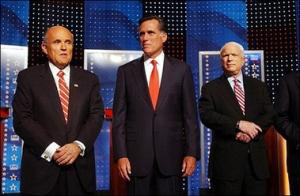 |
 |
 |
 News from Around the Americas | September 2007 News from Around the Americas | September 2007  
Bush Claims He's an 'Asset' to GOP
 Stephen Collinson - Agence France-Presse Stephen Collinson - Agence France-Presse
go to original


| | The GOP's top three candidates...at the moment. (AFP Photo) |
President George W. Bush insisted on Thursday he will be a "strong asset" for Republicans battling for election in 2008, despite shaky opinion poll ratings born of a tumultuous presidency.

Bush, who has 16 months left in his second term, laid out a battle-plan for 2008 Republican candidates, based on a robust 'war on terror' policy, support for Iraq and low taxes.

"Strong asset," Bush said emphatically, when asked at a White House news conference whether he would be an asset or liability for Republicans in presidential and congressional elections next year.

"Candidates who go out and say that the United States is vulnerable to attack and we're going to make sure our professionals have the tools necessary to protect us are going to do well," said Bush, who appeared invigorated by the question.

"Candidates who go out and say that helping these Iraqis realize the benefits of democracy are going to do well," said Bush who has often said that only future historians will offer a true judgement on his presidency.

"Candidates who go out and say that it's very important for the United States to have clear principles when it comes to foreign policy, they'll do well."

"Candidates who say we're not going to raise your taxes will do well."

Presidential legacies frequently pose difficult questions for the campaigns of candidates from the same party who have their eyes on the White House.

As they vie for the Republican nomination, Bush's potential heirs have had to balance the president's political liabilities and perceived errors on the unpopular Iraq war, with his still robust standing among some party activists.

Unusually, in this election cycle, there is no vice president in the race, as Bush's right-hand man Dick Cheney has no plans to be a candidate.

In a Republican debate in August, former Massachusetts governor Mitt Romney tried to distance himself from Bush, and to associate himself with him and Cheney's 'war on terror' policies in one breath.

"I can tell you, I'm not a carbon copy of President Bush," he said.

"I know they make mistakes, but they have kept us safe these last six years. Let's not forget that," he said.

Another Republican candidate, Senator John McCain, has severely criticised the administration's stewardship of the occupation in Iraq, reserving special scorn for former defense secretary Donald Rumsfeld.

But he has been a staunch supporter of Bush's Iraq 'troop surge' and is hoping the president's declaration last week that the strategy is a success will help revive his own lagging political fortunes.

Democratic candidates for 2008 are meanwhile trying capitalize on the fierce opposition to the war and the hatred towards Bush harbored by many of their most fiery partisans.

In Congress, Republicans also face an uphill battle, with a number of high-profile retirements among lawmakers. In the Senate only 12 Democratic seats are up for reelection, compared to 21 Republicans.

A Harris Interactive poll published on Tuesday showed that 67 percent of Americans believe Bush is doing a bad job in running the United States -- though his ratings were better than in July when the figure was 73 percent.

Bush's performance rating has been in decline since the heady days of October 2001, when a record 88 percent of Americans gave him good marks for a job well done.

The US president's popularity reached its lowest point ever in July, when only around one-quarter of Americans felt he was doing a good job. | 
 | |
 |



